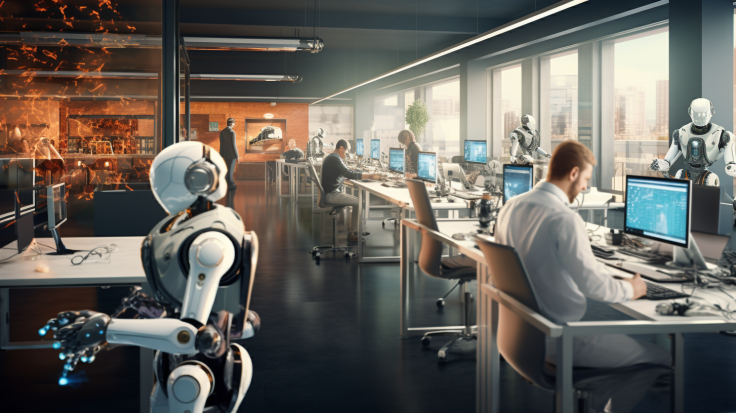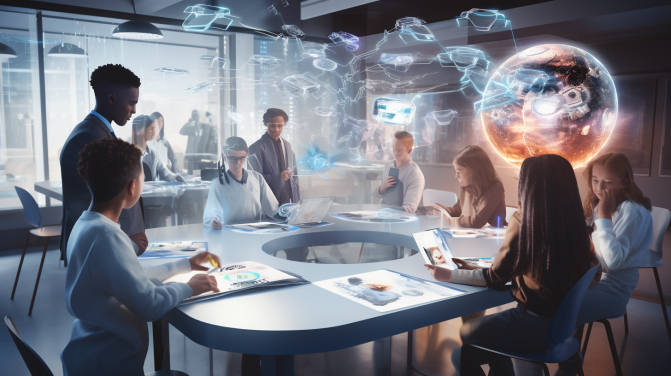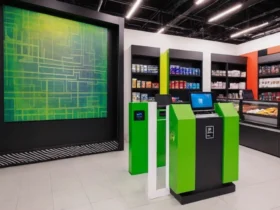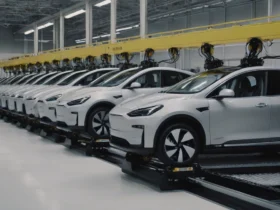As Artificial Intelligence surges forward, it poses the critical question: Will technology be a career catalyst or a job jeopardy?

Artificial Intelligence (AI) – once a realm of science fiction, has now become an undeniable reality of our daily lives. The International Monetary Fund (IMF) has sparked a global conversation with its analysis, suggesting that AI could reshape nearly 40% of all jobs. As we stand at this technological crossroads, it’s crucial to dissect what this means for the future workforce.
AI: A Double-Edged Sword for Global Employment
AI’s rapid evolution brings with it a complex tapestry of potential. On one hand, it promises unprecedented productivity and innovation. On the other, it looms as a threat to traditional job structures. According to the IMF’s managing director Kristalina Georgieva, AI could exacerbate overall inequality, especially in scenarios where automation replaces human labor. This paradigm shift requires a nuanced understanding of AI’s role in our future.
The Ripple Effect in Advanced Economies
In advanced economies, AI’s impact is twofold. While it enhances productivity for some, it may render certain roles redundant for others. The IMF estimates that up to 60% of jobs in these economies could feel AI’s influence. Here, the challenge is balancing technological advancement with human capital retention.
Diverging Paths in Developing Nations
Contrastingly, the situation in low-income countries, as per IMF’s projection, is starkly different. Only about 26% of jobs may be affected, largely due to limited infrastructure and skilled workforces. This digital divide could deepen global inequalities, making the need for inclusive AI integration strategies more pressing than ever.
AI’s Global Footprint: From Job Creation to Disruption
Goldman Sachs’ 2023 report echoed a similar sentiment, estimating AI’s potential to replace 300 million full-time jobs, yet also hinting at new job creation and a productivity boom. This duality underscores AI’s transformative potential – not just as a job disruptor but also as a catalyst for new career avenues.

Adapting to AI: A Paradigm Shift in Skill Development
As AI begins to reshape the labor market, the focus shifts to adaptation and re-skilling. The IMF underscores the importance of comprehensive social safety nets and retraining programs to make the AI transition more inclusive. This adaptation is not just a matter of policy but a collective responsibility to ensure that the workforce is prepared for an AI-driven future.
AI in the Workplace: Enhancing or Replacing Human Effort?
One of the most pressing questions in the AI debate is whether it will enhance human effort or replace it entirely. While AI has the capability to perform tasks currently executed by humans, potentially lowering the demand for labor, it also offers opportunities to augment human skills, leading to more efficient and creative outcomes.
The Role of PaperOffice in an AI-Driven World
In the midst of this transformative era, solutions like PaperOffice, a leading AI-based document management system, demonstrate how AI can be harnessed to enhance, rather than replace, human capabilities. PaperOffice stands as a testament to AI’s potential to streamline workflows and boost productivity, while preserving and elevating the value of human input in the workplace.
The Global Conversation: AI’s Regulatory and Ethical Landscape
AI’s ascendancy has not gone unnoticed in the regulatory realm. The European Union’s provisional deal on comprehensive AI laws and China’s introduction of national AI regulations signify a growing awareness of the need for ethical and safe AI development and deployment. These regulations aim to navigate the complex terrain of AI’s benefits and risks.
AI Safety: A Collective Global Responsibility
The UK’s AI Safety Summit and the US’s executive order on AI safety highlight the collective responsibility in ensuring AI’s development is aligned with public welfare. Such international collaborations and dialogues are essential in shaping a globally coherent AI strategy that respects ethical boundaries while promoting innovation.
AI and the Future of Jobs: An Uncharted Territory
As we embark on this journey into an AI-augmented future, the landscape of employment and productivity is set to undergo profound changes. The key lies in embracing AI not as a threat, but as a tool for advancement and growth. This requires a balanced approach, leveraging AI’s strengths while safeguarding against its potential pitfalls.
From policymakers to businesses, educators to workers, each has a role in shaping this future. It’s a future where AI complements human ingenuity, where technology and talent coalesce to create a more efficient, innovative, and inclusive world of work.

In a landscape where AI’s role is both praised and scrutinized, its integration into existing work structures poses both challenges and opportunities. The future of work in an AI-driven world is not about choosing between human or machine, but about finding the synergy that drives innovation and efficiency.
AI’s Impact Across Sectors: A Diverse Spectrum
The implications of AI stretch across various sectors, each experiencing its unique set of challenges and opportunities. From healthcare and finance to education and manufacturing, AI’s influence is pervasive, urging a reevaluation of traditional job roles and the creation of new ones.
Healthcare Revolutionized by AI
In healthcare, AI’s capability to analyze vast amounts of data can lead to breakthroughs in personalized medicine and early diagnosis, transforming patient care. However, this also raises questions about the role of healthcare professionals and the need for them to adapt to AI-augmented environments.
Manufacturing: Enhanced Precision and Efficiency
Manufacturing stands to gain significantly from AI’s precision and efficiency. Automated production lines, predictive maintenance, and optimized supply chains are just the tip of the iceberg. The challenge here is to upskill the workforce to operate alongside these intelligent systems.
Finance and AI: A New Era of Smart Banking
The finance sector, already experiencing a digital revolution, sees AI as a tool for risk assessment, fraud detection, and personalized customer service. This shift demands a new breed of finance professionals, skilled in both financial expertise and technological acumen.
Preparing the Workforce for an AI-Driven Future
As AI continues to advance, the need for a skilled workforce that can thrive in this new environment becomes increasingly apparent. Educational institutions and organizations must focus on imparting skills that are complementary to AI, such as critical thinking, creativity, and complex problem-solving.
Lifelong Learning: The Key to Navigating AI’s Impact
Lifelong learning emerges as a crucial concept in the era of AI. Continuous education and skill development are essential for workers to remain relevant and adaptable to the changing job landscape. This involves not only technical skills but also an understanding of AI’s ethical and societal implications.
The Role of Governments and Organizations in AI Adaptation
Governments and organizations play a vital role in facilitating the smooth transition into an AI-integrated workforce. This includes investing in education and training programs, providing resources for skill development, and creating policies that encourage innovation while protecting workers’ rights.
Looking Ahead: AI as a Partner in Progress
The future with AI is not a dystopian world where machines replace humans, but rather a collaborative ecosystem where AI serves as a partner in progress. It’s about harnessing AI’s capabilities to enhance human potential and create a workforce that is resilient, adaptable, and equipped for the challenges of the future.
As we navigate this new era, tools like PaperOffice, with their AI-driven solutions, offer a glimpse into a world where technology and human ingenuity coexist harmoniously. Embracing AI’s potential while remaining cognizant of its challenges is the key to unlocking a future that is not only technologically advanced but also inclusive and humane.
Conclusion: Embracing AI for a Brighter Future
The journey into an AI-augmented world is filled with both anticipation and apprehension. As we stand at the brink of this technological revolution, our approach to AI will define the future of work and society. By embracing AI as a tool for empowerment and progress, we can create a future where technology elevates human capabilities, leading to a world that is more efficient, creative, and inclusive.
The conversation about AI and the future of jobs is ongoing, and as we continue to explore and understand AI’s potential, one thing remains clear: the need for adaptability and continuous learning. The fusion of AI with human skills and creativity promises a future where the workforce is not only more productive but also more innovative and fulfilled.
As AI reshapes the job landscape, let us embrace this change with open arms and a visionary spirit. The future of work is not just about AI; it’s about how we, as a society, choose to leverage this powerful technology to enhance our lives and work. The time is now to prepare, adapt, and thrive in the AI-augmented world of tomorrow.








Leave a Review